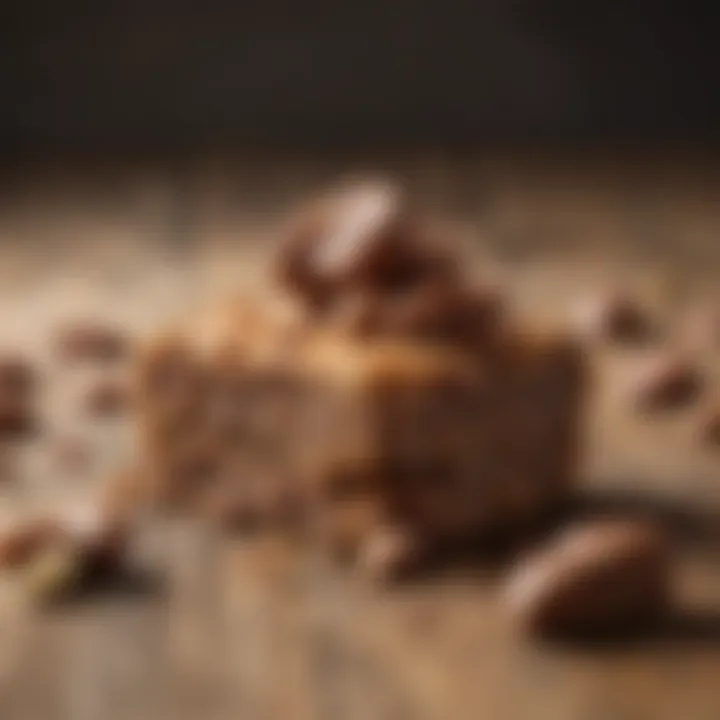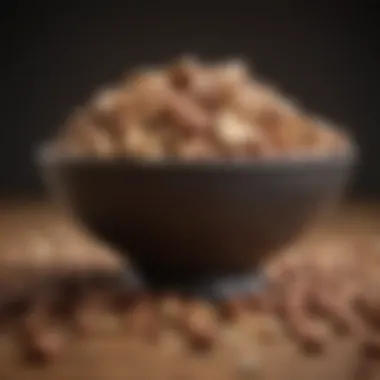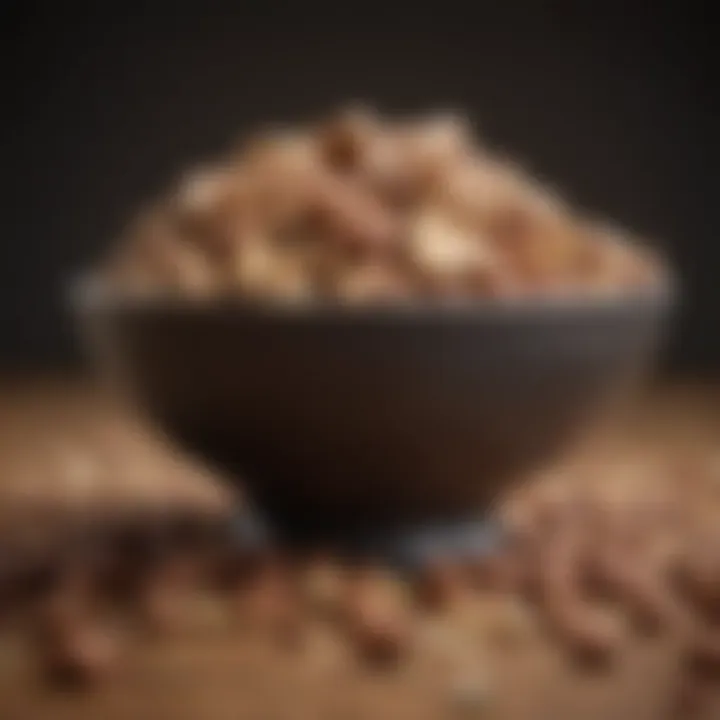CrossFit Healthy Snacks: Fueling Your Performance


Intro
In the realm of fitness, particularly for those engaged in rigorous CrossFit training, the importance of nutrition cannot be overstated. Healthy snacks play a crucial role in maintaining energy levels, supporting muscle recovery, and ensuring overall well-being. This article delves into various healthy snack options that align with the unique demands of CrossFit athletes.
The focus will be on how snacks can enhance performance, reduce fatigue, and aid in recovery post workouts. We will take a closer look at important nutritional aspects, including macronutrient balance and ingredient sourcing, to help you make informed choices about your diet.
Let’s begin our exploration of how the right snack choices can shape your CrossFit journey and elevate your training experience.
Key Takeaways
- Importance of Nutrition: Healthy snacks play a critical role in sustaining energy and aiding recovery for CrossFit athletes.
- Nutritional Content: Emphasis on specific macronutrients—proteins, carbohydrates, and fats—is crucial for optimal performance.
- Hydration: Proper hydration through snack choices can mitigate fatigue and enhance overall physical performance.
- Ingredient Sourcing: Quality ingredients directly impact the effectiveness of the snacks consumed. Only select snacks that include wholesome, nutritious components.
"Nutrition is not just about eating; it’s about learning to live."
- Snack Types: A variety of snack ideas ranging from pre-workout energy boosters to post-workout recovery treats.
Practical Tips
To effectively integrate healthy snacks into your CrossFit regimen, consider the following steps:
- Plan Ahead: Prepare your snacks in advance to avoid the temptation of unhealthy choices when hunger strikes.
- Balance Your Macronutrients: Aim for a mix of proteins, carbohydrates, and healthy fats in your snacks to ensure sustained energy levels.
- Hydration Matters: Pair snacks with hydration strategies. Consider adding electrolyte-rich options like coconut water.
- Incorporate Variety: Keep your snack choices diverse to prevent monotony and ensure a broad spectrum of nutrients.
- Listen to Your Body: Understand your body's needs before and after workouts. Adjust your snack choices according to your own energy levels and recovery needs.
Preamble to CrossFit and Nutrition
Nutrition plays a crucial role in the world of CrossFit, an intense physical training program that demands optimal fuel for peak performance. Understanding the connection between CrossFit and nutrition is essential for athletes and fitness enthusiasts looking to enhance their workouts and recovery.
Understanding CrossFit Demands
CrossFit workouts are varied and often high-intensity. They can include weightlifting, cardio, and bodyweight exercises. The combination requires not only strength but also endurance and agility. For athletes, this results in a need for a diet rich in nutrients to support performance and prevent injury. Each training session puts stress on the body, increasing the need for a balanced approach to nutrition.
Athletes must consider energy expenditure, muscle recovery, and overall health when planning meals and snacks. This requires attention to macronutrient intake—proteins, carbohydrates, and fats—to ensure they are adequately fueled for their workouts.
The Importance of Nutrition
Nutrition is often the unsung hero in fitness. A well-balanced diet can significantly affect performance outcomes. Research shows that proper nutrition can optimize energy levels, enhance recovery, and promote muscle growth. It is critical for CrossFitters to recognize that what they put into their bodies has a direct correlation with their results.
Healthy snacks serve as a bridge between meals, allowing for consistent energy levels. They can help maintain blood sugar, provide quick sources of essential nutrients, and aid in muscle recovery. Understanding how to nourish the body effectively is not only about sustaining energy but also about fostering long-term health.
In summary, CrossFit demands more than just physical training; it necessitates a strategic approach to nutrition. Recognizing the significance of nutrition in this high-stakes environment is a pivotal step for anyone looking to excel in CrossFit. By making informed dietary choices, athletes can elevate their performance and achieve their fitness goals.
Significance of Healthy Snacks for CrossFit Athletes
Healthy snacks play a crucial role in the overall performance and well-being of CrossFit athletes. Given the rigorous demands of CrossFit training, the need for nutrient-dense snacks cannot be overstated. These snacks support both physical exertion and mental focus. They ensure that athletes have adequate energy at all times and help to sustain their stamina during workouts.
Role in Performance Optimization
Snack choices have direct implications on performance. Consuming the right snacks before and during workouts can enhance energy levels significantly. CrossFit workouts are intense, requiring explosive energy and endurance. Incorporating protein, carbohydrates, and healthy fats into snacks is essential for optimizing performance.
- Proteins provide amino acids that help to maintain and repair muscle tissues. A snack like Greek yogurt or a protein bar can effectively supply the necessary protein soon before or after a workout.
- Carbohydrates serve as a primary energy source. Foods such as oatmeal energy bites or baked sweet potato chips deliver fast-acting energy, which is critical during grueling sessions.
- Healthy fats, such as those found in nuts and seeds, support sustained energy release, helping athletes avoid the infamous energy crash that can occur with high-carb, low-fat options.
In essence, healthy snacks equip CrossFitters with the necessary fuel to push through their barriers and reach their performance goals.
Contribution to Recovery Processes
Recovery is just as vital as performance in the realm of CrossFit. After intense workouts, the body requires time and nutrients to repair itself. Healthy snacks can facilitate this recovery process effectively.
In the post-workout phase, the right balance of nutrients is essential:
- Replenishing glycogen stores is critical for recovery. Carbohydrate-rich snacks help restore energy reserves lost during training.
- Consuming proteins post-exercise aids in muscle repair. . Quinoa salad or beef jerky are good options to help support recovery after intense workouts.
- Hydration should not be overlooked. Electrolyte balance is crucial after extensive sweating. Healthy snacks like watermelon or electrolyte-infused drinks can aid in restoring lost fluids and salts.
Thus, integrating appropriate snacks into an athlete's routine is crucial not just for performance enhancement, but also for effective recovery. The overall significance of healthy snacks resonates through improved performance metrics and enhanced recovery, leading to consistent progress for CrossFit athletes.
Nutritional Requirements for CrossFitters
Nutritional requirements for CrossFitters are foundational for optimizing performance and recovery. Understanding these needs ensures that athletes can reach their full potential while minimizing fatigue and injury. Proper nutrition can improve strength, endurance, and overall workout efficiency. It also plays a significant role in protecting the body against overtraining effects, which can affect long-term fitness journeys.
Macronutrient Breakdown
The macronutrient breakdown in a diet for CrossFit athletes should focus on three core components: proteins, carbohydrates, and fats. Each comes with its unique characteristics and benefits that contribute significantly to overall performance and recovery goals.
Proteins
Proteins are critical for muscle repair and growth. After intense workouts, protein helps rebuild the muscle fibers that were stressed during the exercises. The key characteristic of proteins is their ability to provide the amino acids necessary for recovery and muscle building. They offer a beneficial choice for CrossFitters searching for ways to maintain and increase muscle mass. A unique feature of proteins is the variety of sources available, including animal products like chicken and fish, as well as plant-based options such as lentils and quinoa. However, it is essential to balance protein intake, as excessive consumption can lead to unnecessary stress on the kidneys.
Carbohydrates
Carbohydrates are the body's primary energy source, especially crucial for high-intensity workouts like CrossFit. The key characteristic of carbohydrates is their ability to provide quick energy, essential for performance during demanding training. Choices including sweet potatoes, oats, and fruits are popular among CrossFitters. The unique feature of carbohydrates is their capacity to replenish glycogen stores post-exercise, aiding recovery. One potential disadvantage is the risk of choosing highly processed carbohydrates, which can result in energy crashes.


Fats
Fats are another vital macronutrient, serving as an energy reserve and playing a role in hormone regulation. The key characteristic of fats is their slower digestion, providing sustained energy over time. They are a beneficial choice for CrossFitters, particularly in low-intensity workouts or during recovery periods. Healthy fats such as avocado, nuts, and olive oil are excellent sources. A distinctive feature of fats is their omega-3 and omega-6 fatty acids, which can reduce inflammation. However, moderation is crucial since high-fat snacks can lead to excess calorie intake.
Essential Vitamins and Minerals
To support overall health and performance, CrossFitters must also focus on essential vitamins and minerals. These nutrients facilitate various biochemical processes in the body. Vitamins such as B vitamins aid in energy metabolism, while minerals like magnesium support muscle function and recovery. Including a variety of fruits, vegetables, nuts, and whole grains can ensure that the body receives sufficient micronutrients for optimal performance.
A well-rounded diet is the basis of successful training. Balancing macronutrients and ensuring adequate intake of vitamins and minerals is key to maximizing outcomes in CrossFit.
Characteristics of Ideal CrossFit Snacks
Understanding the characteristics of ideal snacks is vital for CrossFit athletes. Proper snacks can enhance performance and recovery. These snacks should provide the body with necessary nutrients before and after workouts. Athletes must consider several elements that dictate the quality of a snack.
Balance of Macronutrients
A balanced macronutrient profile is essential for optimal performance. This means incorporating proteins, carbohydrates, and fats in each snack. Proteins aid in muscle repair and growth. Carbohydrates serve as energy sources, especially during intense workouts. Fats provide long-lasting energy and aid in hormone production.
- Proteins: Include options like Greek yogurt, cottage cheese, or protein shakes. These provide the necessary amino acids for muscle recovery.
- Carbohydrates: Choose complex sources such as whole grain bread, oats, or fruits. They supply sustained energy rather than quick spikes in blood sugar.
- Fats: Healthy fats from avocados and nuts contribute to satiety and overall health.
A well-rounded snack may look like a small smoothie made with Greek yogurt, spinach, and a banana. This combination offers balanced macronutrients and keeps energy levels stable.
Low Glycemic Index Foods
Low glycemic index (GI) foods are important for sustaining energy levels. The GI measures how quickly foods raise blood sugar. Foods with a low GI release glucose slowly. This prolongs energy during workouts and aids in recovery without causing insulin spikes.
Low GI snacks include:
- Sweet potatoes
- Quinoa
- Most fruits and vegetables
- Whole grain products
These foods help maintain steady energy levels, which is crucial when performing high-intensity workouts. Incorporating these ingredients into snacks can optimize performance and enhance recovery.
Hydration and Electrolyte Balance
Hydration plays a critical role in athletic performance. When you exercise, the body loses water and electrolytes through sweat. Snacks that support hydration are valuable. Including fruits with high water content, such as watermelon or cucumbers, can aid in keeping the body hydrated.
Adding electrolytes like sodium, potassium, and magnesium is another consideration. Options that contain these minerals can support recovery and performance. A simple electrolyte-rich snack could include coconut water or a smoothie made with banana and a pinch of salt.
In summary, ideal CrossFit snacks must focus on a balance of macronutrients, incorporate low glycemic index foods, and ensure adequate hydration along with electrolyte balance. This approach helps fuel workouts, optimize performance, and support the body’s recovery processes.
Delicious and Nutrient-Dense Snack Ideas
Healthy snacks play a crucial role for CrossFit athletes. They offer quick energy and essential nutrients without excessive calories. This section explores several delicious and nutrient-dense snack ideas that align with the nutritional needs of CrossFit training. Selecting the right snacks not only enhances performance but also simplifies meal planning. The focus is on options that can be prepared quickly, are easy to transport, and contain values beneficial for workouts and recovery.
Protein-Packed Options
Greek Yogurt Parfait
Greek Yogurt Parfait stands out as a prime example of a protein-rich snack. Greek yogurt is high in protein, which is essential for muscle repair and growth. Adding fruits and nuts can increase fiber and healthy fats while maintaining a low sugar level.
The key characteristic of this parfait is its versatility. You can easily modify the components to suit personal preferences, thus making it a popular choice. The unique feature of Greek Yogurt Parfait is its ability to be a quick snack. It can be prepared in advance, making it ideal for those busy days.
However, one must consider portions, as some granolas can add unnecessary sugars. This snack remains favored among CrossFit enthusiasts due to its balanced nutrient profile.
Beef Jerky
Beef Jerky is another protein-dense option widely embraced by athletes. Its high protein content assists in repairing tissues after intense workouts. It is convenient and has a long shelf life, making it easily accessible.
The key characteristic of beef jerky is its portability and readiness to eat format. It offers a beneficial alternative to traditional snacks that often come with high carbohydrates. While jerky is high in sodium, which can be a concern, moderating intake balances its benefits. It stands as a practical option for CrossFit athletes on the go.
Boosting Energy with Carbohydrate Sources
Baked Sweet Potato Chips
Baked Sweet Potato Chips are an excellent choice for carbohydrate-rich snacks. Sweet potatoes provide complex carbs that offer lasting energy, making them particularly suitable as a pre-workout snack.
The key characteristic of baked sweet potato chips is their natural sweetness while being lower in calories than regular chips. They are easy to prepare and can be seasoned to taste. Their unique feature lies in their fiber content, which aids digestion and helps maintain steady energy levels.
On the downside, portion control is important. Overeating can lead to excess calorie intake. Generally, they offer a wholesome snack option, fitting seamlessly into a CrossFit diet.
Oatmeal Energy Bites
Oatmeal Energy Bites bring together oats and nut butter for an energy-boosting snack. They are rich in carbs and offer a decent amount of protein, thus supporting energy levels during and post-workout.
The key characteristic of oatmeal energy bites is their customizable nature. You can alter the ingredients based on dietary preferences or needs. They are easily transportable, which is a distinct advantage for busy CrossFit athletes.
While they can be calorically dense, monitoring the size ensures they remain an effective source of nutrition. They are praised for their balance of nutrients, making them an advisable addition to a workout plan.
Healthy Fat Choices


Nuts and Seeds Mix
A Nuts and Seeds Mix constitutes an excellent source of healthy fats, which are essential for hormone production and nutrient absorption. The energy density of this snack provides prolonged energy needed for workouts.
The key characteristic of this mix is its variety. With options like almonds, walnuts, and pumpkin seeds, it can be adapted to taste and nutritional needs. The unique feature of nuts and seeds is their rich micronutrient profile, which adds vitamins and minerals crucial for overall health.
However, portion size is important as this snack can lead to an excess of calories when consumed in large amounts. For many, it offers a practical and savory alternative to less nutritious snacking options.
Avocado Toast
Avocado Toast is favored for its smooth texture and rich flavor. Avocado is high in monounsaturated fats, which are beneficial for heart health and recovery in athletes. It also provides fiber, supporting digestive health.
The key characteristic of avocado toast is its ease of preparation. A simple topping on whole-grain bread can transform into a nutrient-rich snack with just a few additional ingredients. The unique feature lies in its balance of rich flavor and nutrition, making it a satisfying choice.
One downside can be its calories per serving, particularly if additional toppings are added. Overall, it is a simple yet effective snack for those engaged in CrossFit.
In summary, adopting these nutrient-dense snack options can significantly augment energy levels and recovery for CrossFit athletes. Finding snacks that suit personal preferences is essential for maintaining a balanced diet.
Pre-Workout Snacks: Timing and Types
Pre-workout snacks play a critical role in maximizing performance and ensuring that athletes can push themselves effectively during training sessions. Timing is just as important as the snack selection itself. Properly timed snacks can provide the necessary energy without causing discomfort or fatigue. Understanding when and what to eat before exercise can lead to improved endurance and strength.
Optimal Timing for Snacking
The timing of pre-workout snacks is paramount. The ideal window for consumption is generally 30 minutes to two hours before exercising. This timeframe allows the body to digest the food and convert it into usable energy. If you snack too close to your workout, there might not be enough time for digestion, leading to stomach discomfort. In contrast, waiting too long can leave you without the necessary energy. Here are some tips for optimal timing:
- 30-60 minutes before: A light snack, like a banana or a small smoothie, can work well. It provides a quick energy source without feeling heavy.
- 1-2 hours before: A more substantial snack, such as oatmeal with fruits or a small sandwich, can be beneficial. It gives the body time to digest.
Listening to your body is critical. Individual preferences and responses to food vary significantly. Monitoring how you feel during workouts after different timings can guide your future snack schedule.
Choosing the Right Snacks
Selecting the appropriate snacks can significantly impact performance. Ideal pre-workout snacks should focus on easily digestible carbohydrates, moderate protein, and low-fat content. Here are some suggestions for what to include:
- Carbohydrate-rich foods: These can provide quick energy. Examples include:
- Protein sources: Help in maintaining muscle mass and providing sustained energy. Some options are:
- Hydration: While not a snack per se, ensuring adequate hydration is crucial. Water or electrolyte drinks can help maintain fluid balance.
- Fruit, like apples or pears
- Whole grain toast
- Rice cakes
- Greek yogurt
- Cottage cheese
- Protein smoothies
Post-Workout Snacks for Recovery
Post-workout snacks play a critical role in aiding recovery for individuals engaged in CrossFit training. The physical intensity of CrossFit can lead to muscle breakdown, energy depletion, and overall fatigue. Consuming the right snacks after a workout is essential for replenishing energy stores and promoting muscle repair. This section delves into the specific elements surrounding post-workout nutrition, highlighting the benefits and considerations of effective recovery strategies.
Replenishing Nutrients
After an intense workout, your body requires a careful balance of nutrients to kickstart the recovery process. This includes carbohydrates, proteins, and certain fats. Carbohydrates are vital for restoring glycogen, which is the body's main energy reserve. Protein aids in muscle repair and growth. Studies suggest a ratio of 3:1 carbohydrates to protein is often ideal for recovery snacks.
Some effective post-workout foods include:
- Whey protein shakes: Whey offers a quick source of protein that can easily be digested.
- Coconut water: This serves as a natural source of electrolytes, supporting hydration while providing some carbohydrates.
- Bananas and nut butter: This combination offers both carbohydrates and healthy fats, rebuilding energy and muscle tissue.
In general, focusing on whole and minimally processed foods helps maximize nutrient intake. Avoiding processed foods with empty calories is crucial for optimal recovery.
Hydration Post-Exercise
Hydration is another key aspect of recovery that should not be overlooked. Throughout a workout, your body loses fluids and electrolytes through sweat. Restoring these fluids is vital to prevent dehydration, enhance recovery, and maintain performance in subsequent workouts.
Drinks that can assist in post-exercise hydration include:
- Water: The simplest and most effective way to stay hydrated post-workout.
- Electrolyte drinks: These can replenish lost minerals like sodium, potassium, and magnesium, which are crucial for muscle function.
A good practice is to drink at least 16 to 24 ounces of water for every pound lost during the workout. Consider using apps or hydration tracking tips to monitor fluid intake.
Hydration is key for both recovery and performance; neglecting it can lead to decreased strength and endurance.
Packable Snack Options for On-the-Go
In the life of a CrossFit athlete, time management often becomes as critical as the workouts themselves. Busy schedules can lead to missed meals or inadequate nutrition, which in turn affects performance. Thus, the concept of packable snacks emerges as a vital solution. These snacks are designed to be portable and convenient, enabling athletes to maintain their energy levels throughout the day.
By integrating packable snacks into daily routines, athletes can ensure they have quick access to nourishment. They serve not just to keep hunger at bay but also to provide essential nutrients needed for workout recovery and overall health. The ease of transportation is crucial, especially for those who spend long hours away from home or work out at different locations.
Convenient Snacks for Busy Schedules
Being conscious of making healthy choices while on the move can make a significant difference. Here are two popular options that effectively serve the needs of busy individuals:
Protein Bars


Protein bars have gained popularity as a go-to snack for many fitness enthusiasts. Their compact size and nutrient density make them a suitable option for those in a hurry. One of the key characteristics of protein bars is their ability to provide a convenient source of protein, which is essential for muscle recovery and growth.
A unique feature of these bars is the variety of flavors and formulations available. Many brands offer high-protein, low-sugar options that cater to differing dietary preferences, whether it be gluten-free or vegan. However, it is important to consider some disadvantages, such as the potential for high levels of processed ingredients in certain products. Readers should be mindful of the labels and choose bars made from whole food ingredients.
Dried Fruits
Dried fruits represent another excellent snack option for those on the go. They are lightweight, non-perishable, and rich in natural sugars, which makes them an ideal energy source for intense workouts. The key characteristic of dried fruits is their convenience; they require no preparation and can be consumed virtually anywhere.
Additionally, dried fruits are packed with vitamins and minerals, contributing to overall health and wellness. For instance, apricots are high in potassium, while raisins provide iron. However, individuals should be cautious of portion sizes, as dried fruits are calorie-dense. Moderation is key to maximizing their benefits without overindulging.
Homemade Snack Recipes
In the realm of nutritious snacking, homemade options can provide both health benefits and control over ingredients. Crafting personal snacks allows for customization based on dietary needs and preferences.
By preparing snacks at home, athletes can include a mix of whole food ingredients while avoiding unnecessary additives. Common recipes might include energy bites made with oats, nut butter, and chia seeds, or trail mixes featuring nuts, seeds, and unsweetened coconut. The flexibility in homemade recipes fosters creativity and ensures that the snacks align with personal health goals.
Considerations for Special Diets
When approaching nutrition in the context of CrossFit, it is essential to factor in individual dietary needs and preferences. Special diets can significantly influence energy levels, performance, and recovery for athletes. Understanding these diets aids in tailoring snacks that not only comply with specific dietary requirements but also contribute positively to athletic pursuits.
Paleo and CrossFit
The Paleo diet emphasizes whole foods, lean meats, fish, fruits, vegetables, nuts, and seeds while excluding processed foods, dairy, grains, and legumes. For CrossFit athletes, this can align well with their goals of building strength and endurance while maintaining minimal body fat.
Choosing snacks within the Paleo framework requires careful selection. Here are some suitable Paleo snacks:
- Beef Jerky: Look for brands without additives.
- Nuts and Seeds: These provide healthy fats and are easy to carry.
- Fruit Bars: Natural fruit snacks without added sugars can offer quick energy.
- Vegetable Crisps: Made from kale or sweet potatoes.
Focusing on nutrient density is important. This diet can provide sufficient protein and healthy fats. However, athletes must ensure they consume enough calories, as some may find the restrictions lead to lower energy intake.
Vegetarian and Vegan Options
For those adhering to vegetarian or vegan diets, snack choices are widely varied, yet still require awareness towards nutritional balance. These options can still deliver essential nutrients needed for CrossFit performance.
Protein is a major focus in these diets. Great sources include:
- Chickpeas: They can be roasted for a crunchy snack.
- Hummus: Paired with vegetables can serve as a nutrient-rich snack.
- Plant-based protein bars: Look for ones made from whole food ingredients.
In terms of carbohydrates, fruits and whole grains are excellent choices. Snacks like:
- Fruit smoothies: Blend greens, fruits, and plant protein sources.
- Whole grain rice cakes: These can be topped with nut butter for a balanced snack.
Important Considerations:
- Monitor for adequate protein intake.
- Ensure sufficient iron and vitamin B12 through fortified foods or supplements.
- Hydration and electrolytes must not be neglected, especially with high-intensity training.
Common Mistakes in Snack Choices
Understanding common mistakes in snack choices is crucial for CrossFit athletes. Proper snacking can make a notable difference in performance and recovery. It is not just about choosing any snack but selecting the right ones.
Overemphasis on Processed Snacks
Many athletes often rely too heavily on processed snacks for convenience. Brands like Quest and RXBAR offer options that may seem appealing due to their marketing and easy availability. However, these snacks can contain high levels of sugars or artificial ingredients. High sugar content may give a quick energy boost, but it can lead to a crash soon after. This can negatively affect workout performance.
Processed snacks often lack essential nutrients vital for recovery and energy. Instead of relying solely on these options, athletes should focus on whole food choices. Incorporating natural snacks such as fruits, nuts, or yogurt can provide more sustained energy and nutrients. Choosing whole foods supports overall health and long-term performance.
Neglecting Hydration
Hydration is often overlooked in snack choices. Athletes may emphasize solid snacks while forgetting about fluid intake. Proper hydration is essential for optimal performance and recovery. Dehydration can impair muscle function and overall recovery. When discussing snacks, it is important to pair them with adequate hydration.
Incorporating foods with high water content, like cucumbers or watermelon, can help with hydration. Additionally, consuming electrolyte-rich snacks after training can aid recovery. This ensures that the body maintains proper fluid balance during high-intensity workouts.
"Proper hydration is as important as choosing the right snacks for any performance-driven athlete."
In summary, avoiding processed snacks and prioritizing hydration can greatly enhance performance. Careful planning in snack selection can support CrossFit training goals effectively.
Closure
The conclusion of this article serves as a crucial summary of the significant elements discussed regarding healthy snacks for CrossFit. A thoughtful selection of snacks can enhance workout performance and recovery. Understanding the intricacies of macronutrients is key. Balancing proteins, carbohydrates, and fats plays an essential role in fueling the body effectively.
Moreover, the article highlighted how snacks can significantly impact recovery post-exercise. This is where nutrient replenishment is vital. A good snack can help reduce muscle soreness and quicken the healing process.
It is also important to consider personal dietary needs. Each individual may have different requirements based on their specific fitness goals and lifestyle. Therefore, taking into account personal preferences when planning snacks is advantageous.
"Nutrition is a key component of fitness, not something to be overlooked."
By understanding these concepts, individuals can make informed decisions about their snack choices, ultimately leading to improved physical performance and overall health.
Recap of Key Points
- Healthy snacks are fundamental for CrossFit athletes.
- Focus on a balanced intake of macronutrients is crucial.
- Snacks assist with recovery and minimize fatigue.
- Personal dietary preferences must be considered.
- Ideal snacks help maintain hydration and energy levels.
Encouragement for Tailored Snack Planning
Every athlete's nutritional needs are unique. Crafting a tailored snack plan can lead to better performance outcomes. Assessing individual activity levels, food preferences, and any dietary restrictions is essential. By doing so, athletes can choose snacks that align well with their personal fitness objectives. This not only enhances workout efficiency but also contributes to overall enjoyment and adherence to a nutritional regimen. The path to success in CrossFit can be significantly influenced by conscientious snack choices.







